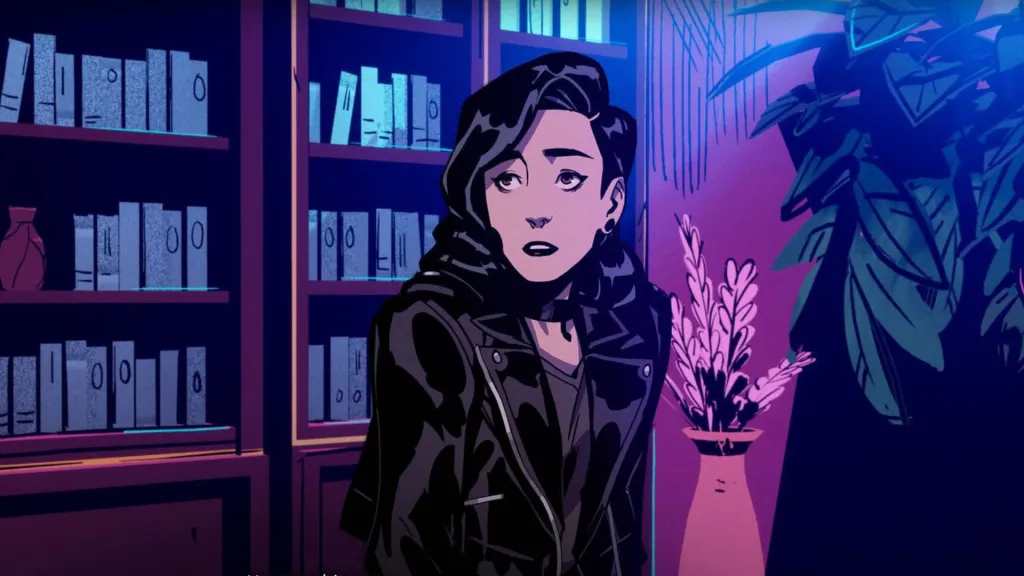It started with a handshake and a hug, and then the rest was history.
Mere moments after renowned video game composer Austin Wintory met Australian game developer Liam Esler in 2018, the pair had teamed up on a video game project the likes of which had never been seen before.
That project — Stray Gods: The Roleplaying Musical — the brainchild of Summerfall Studios, was released in 2023 and has now been nominated for a Grammy Award. It’s the first time an Australian-made video game has received the honour.
Just like the filmic scores of your favourite television shows and movies, music and games are deeply intertwined. But games aren’t a lean back experience; when you’re playing, you become part of the game world and narrative.
Wintory wondered, if we can control the characters on screen, why couldn’t that be the case for the music as well?
“I said to a friend that it would be amazing if there could be a video game musical where songs are the core pillar of the gameplay.”
And that’s what he created.
Musical theatre meets gaming
Wintory acknowledges there are a handful of games that had some musical numbers, but says they were usually featured in a cut scene between traditional gameplay, or as some kind of reward, or maybe underscoring a scripted event.
“There was nothing really interactive about that music, and certainly nothing narratively interactive, where different choices will yield wildly different story outcomes and not just superficial level musical changes.”
That’s where the idea for Stray Gods: The Roleplaying Musical was born.
Stray Gods combines the interactive nature of video games with the dynamism of musical theatre.
In it, players control a young woman named Grace who is drifting through life, but soon discovers that Greek gods live in the modern era, and she’s been given the musical powers of one of the Muses. Grace must discover who killed the Muse Calliope, or she faces the chop herself.
The player can direct whether these musical battle songs are charming, confrontational or quick-witted, with the instrumentation and lyrics adapting to those choices as they play.
How did they pull it off?
To develop a soundtrack that bends and changes based on players’ choices, Wintory and the developers at Summerfall Studios in Melbourne pulled together their own musical ensemble — tapping musical comedy trio Tripod and Eurovision star Montaigne to join the writing team.
Tripod’s Scott Edgar said while making a game with a choice-based story is pretty common, writing songs that felt representative of the player’s choices was much harder.
“I felt I’d been training my whole life for this core challenge by the time it came to us,” Edgar says.
“A traditional narrative branching story is something we’ve seen in games before, but if it’s musical, the challenge then becomes how do you make it still feel like a good song?”
“Thankfully, we already had a thousand years of songwriting theory to turn to. So it really became, what if we just take a traditional pop song structure, and sort of map that to the player’s journey through all the branching narratives, which would mean that certain nodes become choruses.”
Each player has their own unique mix of songs based on their choices, which meant four versions of that soundtrack were released — one for each emotional narrative choice, and one that was a combination.
Jess Serro — who performs as Montaigne — was responsible for climactic pieces in Stray Gods that act as a reward for pursuing a romance with characters like Apollo or Persephone.
“It was really fun, and it was just a bit of a weight off my shoulders as well to be able to write to a brief rather than to my soul,” Serro says.
“The funny thing is, I’ve written songs and top line for a Greek myth theatre production, so I wasn’t exactly green to it, but it definitely is a different thing having to write the alternate options depending on temperament.”
Tripod bandmate Simon Hall worked on the finale song, which pulls together elements from each person’s tailored playthrough themes.
Players also often record their video playthroughs, and have developed a sort of musical notation to refer to which choices they made.
“I’m just most proud to be part of a thing that no one’s ever done before,” said Hall.
Liam Esler, managing director at Summerfall Studios, studied theatre before becoming a game developer. He says despite how they’re usually grouped, games actually have a lot more in common with the stage than the screen.
He says training in theatre was “probably the most useful thing” he could have done as a narrative designer.
“From my perspective the player is both actor and audience in many ways, and writing for games is like writing for theatre,” he says.
“On a stage, there might be a script, but there are so many ways that scripts can be performed — and that’s very much the case with games.”
Wintory says so much content was developed for Stray Gods that it captured a lot of the spirit of improv theatre.
“It’s not about winning. It’s not about gaming the system or figuring out the best version of Grace or any of those kinds of things,” he says.
“The goal was to give the player a tool that let them honestly answer differently enough to another player that it almost was like improv.”












